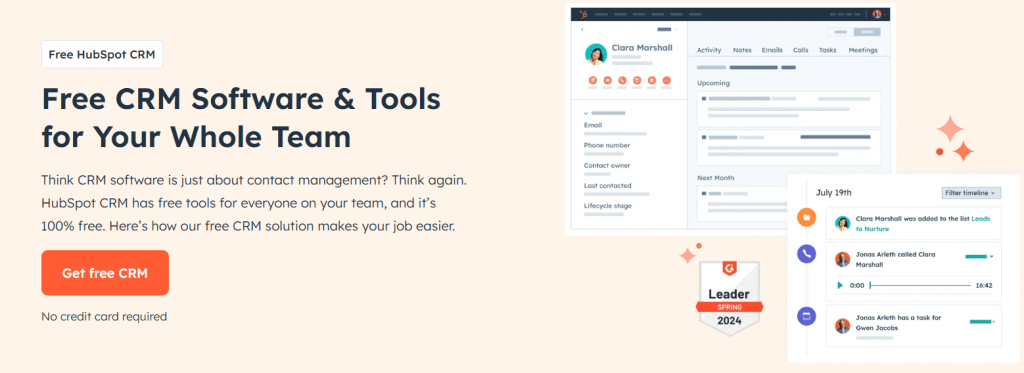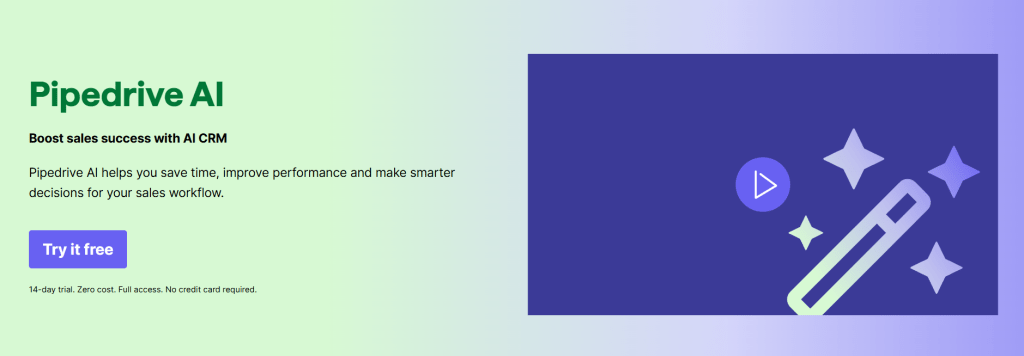Artificial intelligence (AI) is reshaping industries, from customer service to marketing, and now it’s transforming how businesses manage customer relationships. By integrating AI into CRM systems, companies can unlock unprecedented efficiency, automate time-consuming tasks, and gain actionable insights from their data.
If you’re struggling to maximize the potential of your CRM, integrating AI can provide the solutions you need. Whether it’s improving sales forecasting or personalizing customer interactions, AI is revolutionizing CRM systems to make them indispensable tools for businesses. According to a Forrester Consulting survey, 89% of global decision-makers recognize the importance of AI in CRM strategies.
This guide delves into the details of how to integrate AI into CRM systems, exploring their features, benefits, implementation strategies, and the top solutions available in 2024.
Understanding AI-Enhanced CRMs
AI-enhanced CRMs integrate artificial intelligence technologies to automate tasks, analyze large datasets, and deliver actionable insights. These CRMs go beyond basic data organization, enabling businesses to optimize customer interactions and sales processes.
For example, an AI-powered CRM might analyze customer interactions to recommend personalized strategies, predict sales trends based on historical data, or draft tailored emails in seconds.
Transforming CRM Operations with AI
AI brings transformative capabilities to CRM systems, addressing challenges like data overload and manual inefficiencies. Here’s how AI revolutionizes CRM functionality
Lead Scoring and Prioritization
AI identifies leads with the highest conversion potential by analyzing engagement data, demographics, and behavioral patterns. This helps sales teams focus their efforts on prospects most likely to close.
Predictive Sales Analytics
AI uses historical data to forecast future sales trends, providing insights that help businesses stay proactive. Whether planning for seasonal demand or identifying emerging market opportunities, AI ensures informed decision-making.
Automating Routine Tasks
From generating email drafts to categorizing leads, AI reduces the time spent on repetitive tasks. Sales teams can redirect their efforts toward strategic activities like nurturing client relationships and closing deals.
Advanced Custom Reporting
AI enables the creation of customized reports based on specific business needs. These reports offer deeper insights than standard dashboards, helping teams identify patterns and optimize strategies.
Enhancing Customer Interaction
Through natural language processing (NLP), AI-powered chatbots and tools can handle customer inquiries, summarize email threads, and assess sentiment. This ensures efficient communication while maintaining a human touch.
Why Your Business Needs an Integrate AI into CRM
CRMs have long been essential for managing customer data, but the integration of AI takes their utility to the next level. Traditional CRMs excel at storing and organizing data but often fall short when it comes to analyzing trends or automating processes.
By integrating AI into your CRM, your business can:
- Optimize Sales Efforts: AI qualifies leads and flags opportunities, ensuring your team focuses on the most promising deals.
- Enhance Productivity: AI automates repetitive tasks, allowing teams to concentrate on core sales activities.
- Boost Revenue: With AI insights, you can make data-driven decisions that lead to more successful sales strategies.
Addressing Challenges of AI Integration
While AI-enhanced CRMs offer significant advantages, they are not without challenges. Understanding and mitigating these issues is crucial for successful implementation.
Accuracy Concerns
AI’s effectiveness depends on the quality of the data it analyzes. Poorly maintained or incomplete datasets can lead to inaccurate predictions. Regularly auditing and cleaning your CRM data ensures reliability.
Maintaining a Human Touch
AI-generated emails or responses may lack the personalization needed to build strong client relationships. Instead of relying entirely on AI, use its outputs as a starting point and add personal touches to make communications more impactful.
Initial Costs and Training Needs
Integrating AI features into a CRM can be expensive and may require a learning curve for employees. Comprehensive training programs and a phased implementation approach can help employees adapt and maximize ROI.
Steps to Integrate AI into CRM
The journey to AI-enhanced CRM success begins with careful planning and execution. Here’s how to get started
Define Clear Objectives
Before implementing AI, establish specific goals for your CRM. These might include improving lead qualification, automating email campaigns, or generating advanced reports. Clear objectives will guide your choice of tools and strategies.
Select the Right Tools
Decide whether to upgrade to a CRM with built-in AI functionalities or enhance your current CRM with third-party integrations. Tools like Make provide seamless AI add-ons for non-AI CRMs.
Train Your Team
Ensure employees understand how to use the AI tools effectively. Provide detailed documentation, conduct training sessions, and encourage hands-on practice to build confidence.
Start Small with Pilot Projects
Introduce AI features incrementally to address specific needs. Pilot projects allow teams to familiarize themselves with AI tools while identifying and resolving potential issues.
Monitor and Optimize
Track performance metrics such as prediction accuracy, lead conversion rates, and time savings to evaluate the success of AI integration. Use this data to refine your approach and ensure continuous improvement.
Top AI-Powered CRM Solutions for 2024
Several CRM platforms stand out for their AI capabilities. Here are three leading options to consider
HubSpot

HubSpot offers a suite of AI tools designed to streamline sales and marketing efforts. Its ChatSpot feature allows users to perform tasks through a conversational interface, while other tools automate deal tagging, sales forecasting, and email drafting.
Freshsales

Freshsales is equipped with Freddy AI, a tool that analyzes lead data to prioritize high-potential prospects. Freddy also provides predictive insights, helping sales teams close deals more effectively. Its email generation capabilities further enhance productivity.
Pipedrive

Pipedrive has carved a niche in the CRM market by combining simplicity with powerful AI-driven tools. Its AI Sales Assistant not only identifies high-priority deals but also provides actionable recommendations, such as the next steps to take or emails to send. This makes it an essential tool for businesses seeking to optimize their sales pipelines without investing in overly complex systems.
What sets Pipedrive apart is its ability to deliver top-tier AI features at a lower price point compared to competitors like Salesforce or HubSpot. This affordability, coupled with robust capabilities, makes it highly attractive for small to medium-sized businesses.
Pipedrive AI CRM Features That Boost Sales Efficiency
- AI Sales Assistant
The AI Sales Assistant in Pipedrive analyzes past deals and customer interactions to identify leads with a high probability of closing. It sends alerts about trending deals and suggests the best actions to move them forward, whether it’s scheduling a meeting or sending a follow-up email. - Predictive Sales Analytics
Pipedrive’s AI capabilities extend to predictive analytics, enabling businesses to forecast sales outcomes based on historical data. This helps sales teams allocate resources effectively and set realistic goals. - Automated Email Communication
Writing personalized emails can be time-consuming. Pipedrive AI CRM simplifies this by generating email drafts tailored to specific leads. The system can also rephrase existing drafts to make them more compelling, saving valuable time for sales teams. - Email Summarization
For businesses handling long email threads, Pipedrive’s AI summarization feature extracts key points and assesses customer sentiment. This helps teams stay on top of conversations and tailor their responses to drive engagement. - Customizable Workflows
Pipedrive AI CRM offers flexible automation options, allowing businesses to create workflows that match their unique sales processes. These workflows help automate repetitive tasks like lead categorization and deal tracking.
Enhancing Non-AI CRMs with Integrations
If your current CRM lacks AI features, tools like Make can bridge the gap. This no-code platform allows you to integrate AI functionalities into your CRM seamlessly. With Make, you can set up automated workflows for tasks such as personalized email generation or deal tracking, ensuring your CRM stays ahead of the curve.
Measuring the Impact of AI in Your CRM
To determine whether your AI-enhanced CRM is delivering value, track key metrics. These include:
- Prediction Accuracy: Evaluate how well AI tools forecast sales trends and identify opportunities.
- Time Savings: Measure the reduction in time spent on repetitive tasks.
- Revenue Growth: Assess the impact of AI on closed deals and overall earnings.
Regularly reviewing these metrics ensures your AI strategy remains aligned with business goals and delivers a strong ROI.
The Future of AI in CRM
AI is rapidly transforming how businesses manage customer relationships, making CRM systems smarter and more efficient. By embracing AI now, your business can stay ahead of competitors, improve decision-making, and unlock new growth opportunities.
Whether you’re upgrading to an AI-powered CRM or enhancing your existing system, the potential benefits are immense. With the right tools, training, and strategy, 2024 could be the year your CRM becomes your most valuable business asset.
What are the main benefits of using AI in a CRM?
AI in a CRM enhances productivity and decision-making by automating repetitive tasks, analyzing large datasets for actionable insights, and prioritizing high-value leads. It also improves sales forecasting, personalizes customer interactions, and boosts overall revenue potential.
Can AI work with my existing CRM, or do I need to switch platforms?
AI can often be integrated into your existing CRM using third-party tools like Make or Zapier. However, if you want a seamless experience with built-in AI features, consider upgrading to an AI-powered CRM like HubSpot, Freshsales, or Pipedrive.
What challenges should I expect when implementing AI into my CRM?
Challenges include ensuring data quality for accurate predictions, maintaining a human touch in AI-generated content, and managing upfront costs and training needs. Pilot tests and gradual implementation can help address these challenges effectively.
How do I measure the success of AI integration in my CRM?
Key metrics to track include prediction accuracy, lead conversion rates, time saved through automation, and revenue growth. Regularly monitoring these metrics will help refine your AI strategy and measure ROI.
Is AI in CRMs secure?
Most modern AI-powered CRMs have robust security measures, including encryption and data access controls, to protect sensitive information. If you use third-party AI tools, ensure they comply with industry standards and best practices for data protection.



I very delighted to find this internet site on bing, just what I was searching for as well saved to fav
Your blog stands out in a sea of generic and formulaic content Your unique voice and perspective are what keep me coming back for more
Great information shared.. really enjoyed reading this post thank you author for sharing this post .. appreciated
Bilgiler için teşekkür ederim işime son derece yaradı